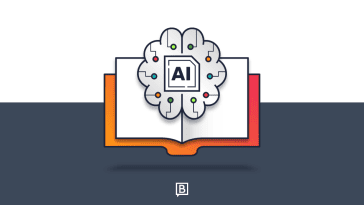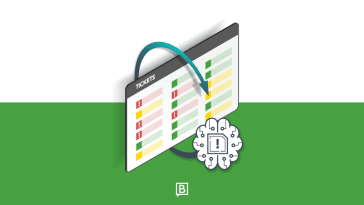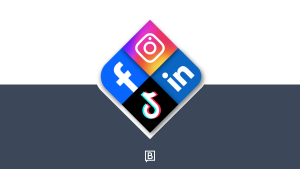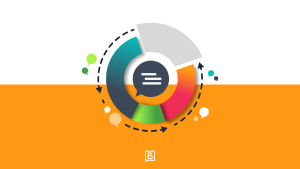Your marketing team just dropped another six figures on Google Ads. Meanwhile, your competitor’s CEO gave a 20-minute interview that landed a quote in a respected trade publication.
Now, when potential buyers ask AI assistants like ChatGPT or Claude for recommendations, guess which company they hear about?
Welcome to the AI discovery era; the biggest shift in how people find and trust information since the birth of Google.
Search engines index websites. But AI discovery tools index authority.
They surface expert voices, not optimized headlines. These days, your quote in a trade publication could be more valuable than your entire paid media budget.
Let’s dive in.
The Discovery Shift: From Search to AI Discovery
Once upon a time, discovery started with Google. Now? It starts with ChatGPT, Claude, or Perplexity. People ask these tools open-ended questions like:
- “What’s the best CRM for small businesses?”
- “What do experts recommend for B2B social media?”
- “Who are the top voices in AI and customer experience?”
What’s more, advertisers are quickly learning that AI discovery means that their search budgets must change.
EMARKETER now projects U.S. advertisers will pour over $25 billion—about 14% of all search budgets—into AI-powered search results by 2029. [Forbes]
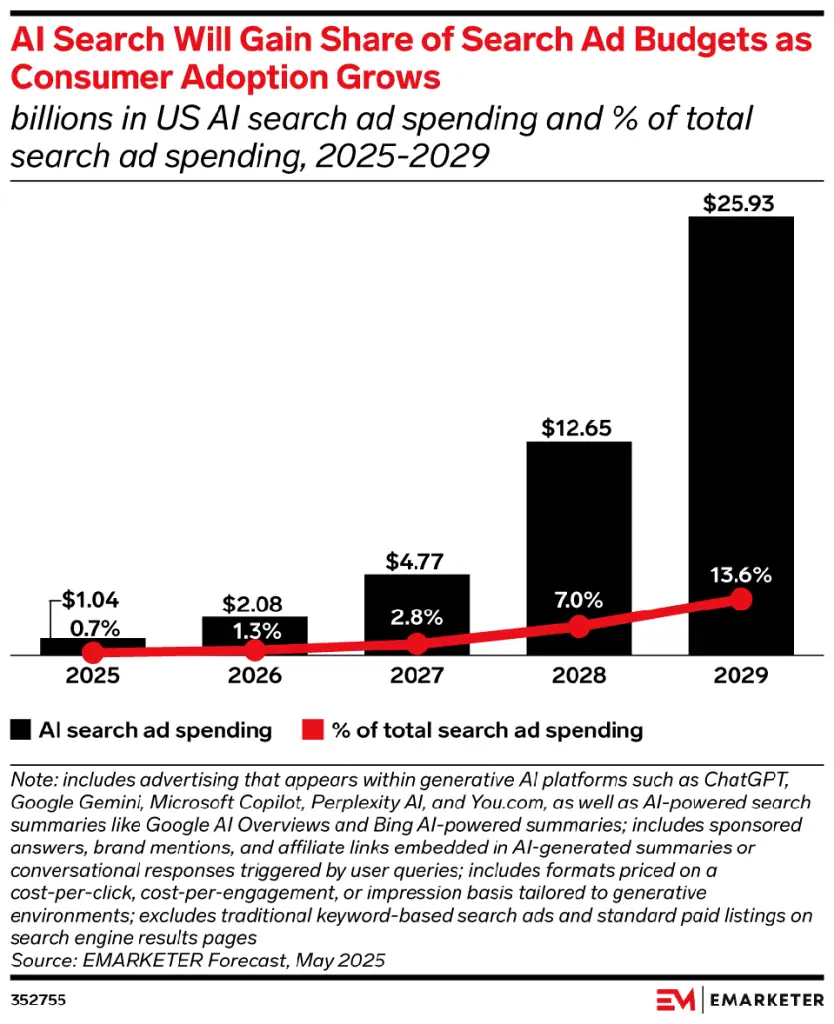
[Source]
AI discovery is the new front door. These platforms synthesize expert content, citations, and sentiment … not ads. And more importantly, they don’t operate like search engines.
Instead, AI tools prioritize:
- Authority – Are you a cited expert or thought leader?
- Reputation – Is your name associated with trusted sources?
- Relevance – Are you showing up in contextually important conversations?
SEO got you traffic. AI discovery gets you trust.
Why Authority is the New SEO
Search Engine Optimization (SEO) was all about keywords, links, and rankings.
AI discovery is about AEO, or Answer Engine Optimization. And AEO rewards credibility over clicks.
AI assistants don’t scrape the web for the newest blog post. They synthesize knowledge from:
- Trusted publications
- Expert commentary
- Analyst research
- Authoritative thought leadership
Here’s the key: AI trusts people, not pixels.
My friend, Gini Dietrich, is the founder of Spin Sucks and the creator of the PESO Model©. When I asked her about AI discovery, she had this to say:
“AI search doesn’t reward keywords; it rewards credibility. If you aren’t showing up in AI answers, it’s not an SEO problem—it’s a PR problem.”
Gini created the PESO Model©, which has been foundational for many marketers for years! Take a look at how it works below.
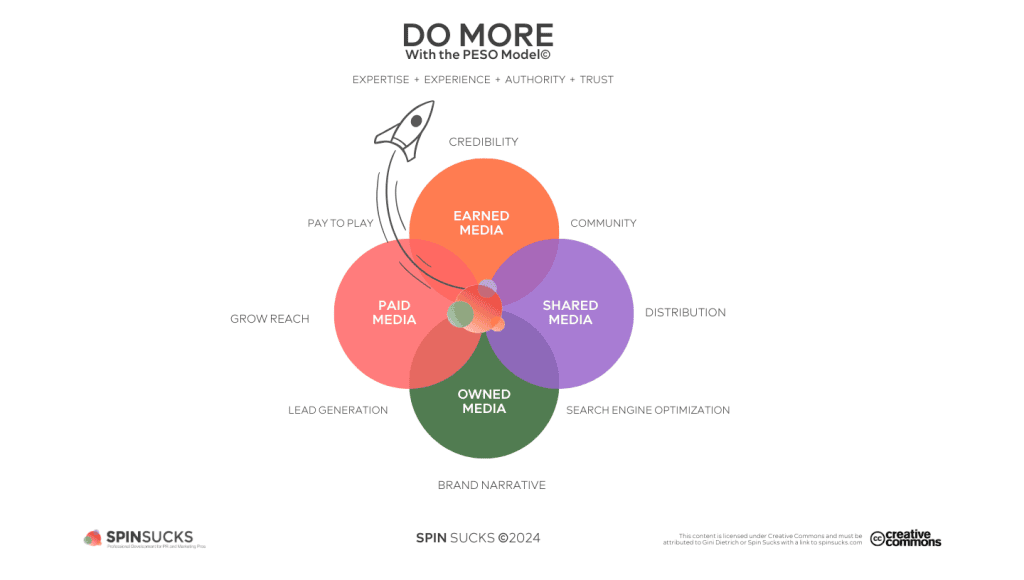
Ultimately, if your brand isn’t quoted, cited, or contributing to reputable sources, you’re likely invisible in AI discovery pathways. Yes, even if your website is optimized to the teeth!
PR vs. Paid Media: What AI Actually Values
Paid media disappears the second your budget does. But earned media? That lives in the system.
AI discovery engines pull from:
-
Articles in respected outlets
-
Expert interviews
-
Analyst citations
-
Publicly available knowledge graphs and PDFs
These sources are not only retrievable by AI, they’re also often part of the training data used to build these systems in the first place.
Let that sink in: One quote in a respected article could influence thousands of AI interactions.
Compare that to a 6-week ad run that disappears when your spend ends.
“This is the moment PR was made for,” says Dietrich. “In an AI-driven world, visibility isn’t bought—it’s earned. And PR is how you earn it.”
Becoming the Source AI Recommends
So, how do you show up in AI discovery results? Not through banner ads, but by becoming the expert source AI wants to cite.
Here’s how:
- Get quoted in earned media. Prioritize PR, not just promotion.
- Publish on high-authority platforms. Think Harvard Business Review, Forbes, Fast Company (not Medium).
- Engage in analyst conversations. Reports from firms like Gartner or Forrester often show up in enterprise queries.
- Show up where your buyers search. Even Quora, Reddit, and Substack can be powerful signals when handled strategically.
Your brand becomes discoverable in AI systems when it shows up in the places they trust.
The Real ROI of Authority
Let’s do some simple math:
-
You spend $100K on Google Ads. You get clicks, maybe leads.
-
You spend 2 hours with a journalist and land a quote in Inc. or The Information. That quote is picked up by Claude, cited by Perplexity, and read aloud by ChatGPT … thousands of times.
Which has more staying power? More credibility? More compound ROI?
Thought leadership is a long game. But in the age of AI discovery, it pays faster than you think.
Your Takeaway
Don’t just publish. Get quoted!!
Don’t just advertise. Build authority!!
“AI discovery is not a future trend—it’s here, and it’s changing the rules,” says Dietrich. “Brands that prioritize PR will own the conversations that AI surfaces, while others get left out of the answers entirely.”
As AI discovery takes hold as a mainstay, your visibility is earned. What’s more, that visibility shapes who gets recommended, remembered, and reached.
FAQs: Getting Visible in the Age of AI Discovery
- Q: What is AI Discovery? AI Discovery is how tools like ChatGPT, Claude, and Perplexity recommend brands, people, and solutions based on what they’ve learned—not what’s advertised. These systems surface content from trusted sources like earned media, expert interviews, and research—not search-optimized websites or paid ads.
- Q: How is AI Discovery different from SEO? SEO helps you rank in search engines like Google using keywords, links, and technical optimization. AI Discovery rewards authority and credibility—not page rank. If you want to be “found” by AI, you need to be quoted, cited, and referenced by sources those models trust.
- Q: Can paid media help with AI Discovery? Not really. Paid media vanishes the moment your budget dries up. AI doesn’t see your banner ad—it sees your byline in a reputable publication or your name cited in a research report. That’s why PR has a longer-lasting—and more powerful—impact on AI visibility.
- Q: What are some fast ways to boost my brand authority? Pitch and land earned media interviews; Get quoted by journalists (HARO, Qwoted, and direct pitching work!); Partner with analysts or industry experts; Publish POV content on high-authority platforms (Forbes, HBR, etc.); Use frameworks like PESO (Paid, Earned, Shared, Owned) to balance efforts.
Latest posts by Brooke B. Sellas (See All)
- Outsourced Social Media Content Creation: Protect Quality Control and Brand Consistency - October 22, 2025
- Social Media Customer Care: Done Right It Leads To Retention And Sales Opportunities - October 15, 2025
- Platform-Specific Social Care: Tailoring Customer Service for Each Channel - October 8, 2025





